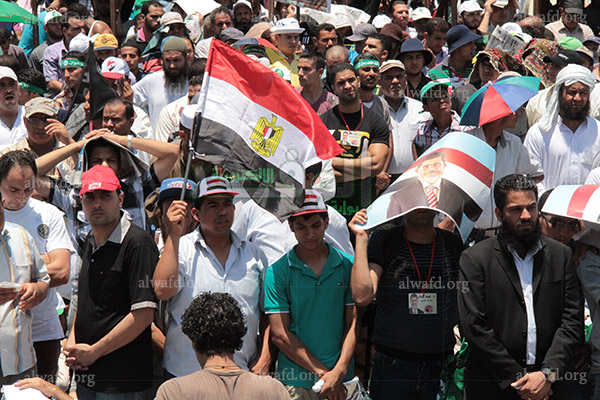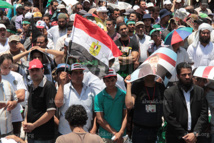Ahmed Maher, Ahmed Douma and Mohamed Adel are the first secular activists to go on trial amid a massive months-long crackdown on Islamists following the military's July 3 overthrow of Morsi, the country's first democratically elected leader.
They are also charged with violating a controversial new law that bans all but police-sanctioned protests.
Rights groups have cast the trial as an extension of the government's crackdown on public dissent less than three years after Hosni Mubarak was toppled by massive pro-democracy protests.
Maher is the founder of the April 6 youth movement that led the revolt against Mubarak. All three defendants were leading dissidents under Mubarak and supported the military's overthrow of Morsi, whom they accused of betraying the 2011 "revolution."
The activists face several charges, including assaulting police officers and joining a protest without seeking a police permit as required by the new law.
Maher and Douma, who were ordered detained until the next hearing, have denied the accusations, while Adel is being tried in absentia.
"We will pursue our struggle inside and outside (the prison), the authority which is using the judiciary to put us in jail will fall," Douma told AFP.
At the hearing, which was held in a Cairo police academy and attended by EU representatives, lawyers for the activists said none of the prosecution's evidence mentioned their clients by name.
Maher and Douma were arrested after Maher's supporters allegedly scuffled with police outside a Cairo court on November 30, when Maher handed himself in for questioning on suspicion he had organised an illegal protest.
The passage of a law on November 24 that bans all but police-authorised protests has angered secular activists, who had viewed the military-installed government, which has pledged a democratic transition, as a lesser evil than Morsi.
Police have also arrested another prominent secular activist, Alaa Abdel Fattah, for allegedly participating in a violent and illegal protest.
The longtime activist and blogger had previously been jailed under Mubarak, the military junta that ruled after his 2011 overthrow, and Morsi.
The United States and human rights groups have expressed concern about the protest law, which was introduced after Egypt lifted a three-month state of emergency.
Since Morsi's overthrow the authorities have arrested thousands of his supporters, including virtually the entire top leadership of his Muslim Brotherhood, which prevailed in a series of polls held after Mubarak's ouster.
On August 14 security forces stormed two pro-Morsi sit-ins in Cairo, setting off clashes in which hundreds of people were killed, mainly Morsi supporters, in the worst mass killing in Egypt's modern history.
Morsi himself remains in detention, charged with inciting violence against protesters during a rally outside the presidential palace in December 2012.
----------------------------------------------------------------------------------------------------
They are also charged with violating a controversial new law that bans all but police-sanctioned protests.
Rights groups have cast the trial as an extension of the government's crackdown on public dissent less than three years after Hosni Mubarak was toppled by massive pro-democracy protests.
Maher is the founder of the April 6 youth movement that led the revolt against Mubarak. All three defendants were leading dissidents under Mubarak and supported the military's overthrow of Morsi, whom they accused of betraying the 2011 "revolution."
The activists face several charges, including assaulting police officers and joining a protest without seeking a police permit as required by the new law.
Maher and Douma, who were ordered detained until the next hearing, have denied the accusations, while Adel is being tried in absentia.
"We will pursue our struggle inside and outside (the prison), the authority which is using the judiciary to put us in jail will fall," Douma told AFP.
At the hearing, which was held in a Cairo police academy and attended by EU representatives, lawyers for the activists said none of the prosecution's evidence mentioned their clients by name.
Maher and Douma were arrested after Maher's supporters allegedly scuffled with police outside a Cairo court on November 30, when Maher handed himself in for questioning on suspicion he had organised an illegal protest.
The passage of a law on November 24 that bans all but police-authorised protests has angered secular activists, who had viewed the military-installed government, which has pledged a democratic transition, as a lesser evil than Morsi.
Police have also arrested another prominent secular activist, Alaa Abdel Fattah, for allegedly participating in a violent and illegal protest.
The longtime activist and blogger had previously been jailed under Mubarak, the military junta that ruled after his 2011 overthrow, and Morsi.
The United States and human rights groups have expressed concern about the protest law, which was introduced after Egypt lifted a three-month state of emergency.
Since Morsi's overthrow the authorities have arrested thousands of his supporters, including virtually the entire top leadership of his Muslim Brotherhood, which prevailed in a series of polls held after Mubarak's ouster.
On August 14 security forces stormed two pro-Morsi sit-ins in Cairo, setting off clashes in which hundreds of people were killed, mainly Morsi supporters, in the worst mass killing in Egypt's modern history.
Morsi himself remains in detention, charged with inciting violence against protesters during a rally outside the presidential palace in December 2012.
----------------------------------------------------------------------------------------------------









 Home
Home Politics
Politics











